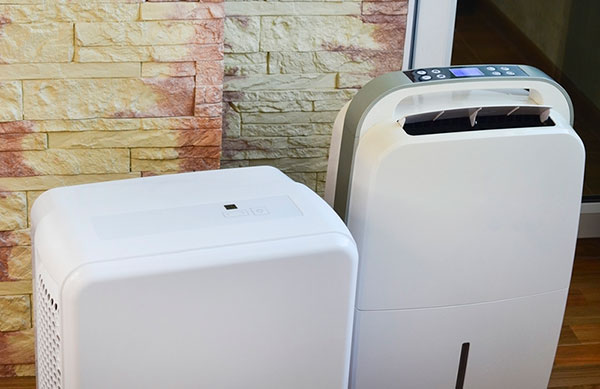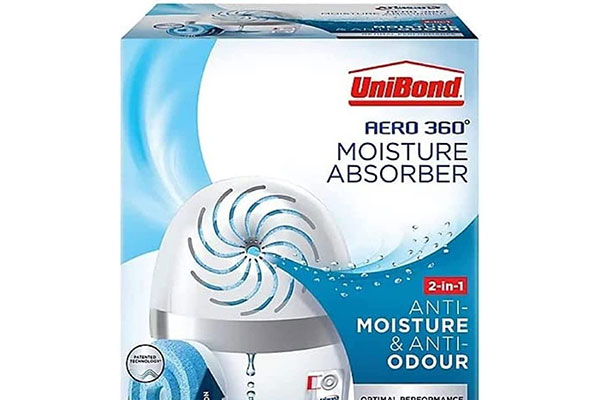The right dehumidifier is out there and available for everyone. However, finding the correct one for your needs can be a challenge. Apart from choosing the brand, functions, and features, the design comes down to 2 basic types, the desiccant dehumidifier and the compressor. We will examine both to help you find what fits your needs so you can make an informed decision for your home’s humidity requirements.
How Compressor Dehumidifiers Work
Compressor dehumidifiers are designed for average weather conditions between 5°C and 30°C. Ideally, they function best at 20°C. Warmer conditions tend to allow these units to function better, but in extremely cold temperatures, they can freeze up and severely limit functionality.
Compressor Dehumidifiers work well above 20°C
A compressor dehumidifier works much like a mini refrigerator. Air is pulled in from the surrounding room. It passes through a filter and over cooled coils. Moisture from the air is collected in the reservoir onboard the unit. Air passing through the unit is reheated and passed back out into the air. Users can expect a compressor dehumidifier to extract 5 liters of moisture form the air.
How Desiccant Dehumidifiers Work
Unlike compressor dehumidifiers that rely on refrigerant to dehumidify the air, desiccant dehumidifiers utilize a desiccant material. Generally, the material is known as Zeolite, but there are other materials known to absorb water vapour. The desiccant material is held in a wheel within the unit that rotates allowing it to collect water vapour. Moisture is extracted from the material and collected by the dehumidifier when the wheel is slightly heated.
Desiccant dehumidifiers are rated for conditions at 60% humidity, so they can perform adequately in a wider range of temperatures. Compressor units work primarily in 80% humidity. Due to the lack of functioning parts and cooling needs, desiccant dehumidifiers tend to last longer than compressor units. The process for a desiccant dehumidifier is far less involved than with a compressor dehumidifier unit.
Main Differences
There are many differences with the functionality of desiccant and compressor dehumidifiers, but the primary difference comes down to how the units work. Compressors work with a refrigerant while desiccant dehumidifiers work based off a desiccant material. Both are effective in their dehumidifying attributes. Here are some of the differences between these units.
| Desiccant Dehumidifier | Compressor Dehumidifier | |
|---|---|---|
| Work well in 1-20°C | ✅ | ❌ |
| Work well above 20°C | ✅ | ✅ |
| Longer lifespan | ✅ | ❌ |
| More quiet | ✅ | ❌ |
| Lower initial cost | ❌ | ✅ |
| Lower wattage | ❌ | ✅ |
| Smaller unit | ✅ | ❌ |
| Easy to manage | ✅ | ✅ |
Benefits of Desiccant Dehumidifiers
The primary benefits of desiccant dehumidifiers comes down to overall size and functionality. These units tend to be quieter, lighter, and smaller than comparable compressor units. Additionally, desiccant units can be used in various temperature conditions making them the ideal solution for homeowners living in extreme climates.
Desiccant dehumidifiers are known for consuming more power than compressor units, but they also extract more moisture from the air than a standard compressor system. In the UK, where temperatures can drastically change in a very short time, desiccant units provide far more extraction. Generally, compressor systems run on 370 watts per hour while desiccant units can consume up to 660 watts per hour. However, when moisture extraction is essential, the extra energy used is essential.

EcoAir DD1 Simple Blue Desiccant Dehumidifier
Rotary Control | 7.5 L/Day | Quiet 34dBA | Anti Bacteria Silver Filter | Laundry | 6Kg | Home Garage Basement Boat
With energy prices continually increasing, using more power in a shorter amount of time, as with a desiccant dehumidifier, is more economical than allowing a system to run for longer while extracting less moisture, as with a compressor unit.
Benefits of Compressor Dehumidifiers
Among the top benefits for compressor dehumidifiers is their affordability. These units tend to cost less and use less watts. The units are also made to be quiet and can be connected directly to your HVAC system. Connecting a compressor dehumidifier system allows your unit to work more efficiently and cut down on humidity within the home that raises overall temperature.
Compressor dehumidifiers, like their desiccant counterparts, are easy to set up. Installation is simple, provided you have an interior duct system already available. Additionally, once set up, compressor dehumidifiers offer effortless controls. Touch screen technology is built directly into modern units making them easy to control and maintain.

Devola Low Noise Compressor Dehumidifier with Dust Filter
Perfect for Moisture, Damp and Condensation Indoors with Humidistat, Laundry Mode, Tilt Protection, Continuous Drainage, Auto Restart – DV12L
Where to Use Desiccant Dehumidifier
Garages
Garages are one of the more susceptible places in a home for humidity concerns. Unless they are tied into the home’s HVAC, a garage is merely a holding area for a car or our belongings, so there is virtually no heating or cooling. However, a garage can hold some of our most prized possessions. Often antique vehicles and sentimental belongings are stored in the area which can lead to mould and rot. No one wants to find mould in the interior of their prized antique car or see evidence of rot on their grandmother’s linens. A desiccant dehumidifier is the answer. Find our more about dehumidifiers for garages in our guide here.
Unheated Rooms
Not all rooms of a home are connected to the HVAC system. Certain areas such as root cellars in older homes and some basements remain prone to the effects of cold or hot temperatures. A desiccant dehumidifier allows those areas to remain useful for storage and enhance usability of the space. Where a basement may sometimes be thought of as a dark, humid filled space, a desiccant dehumidifier can turn it into a place where food remains fresh and old items such as books, photographs, and all your valuables stay pristine.
Standard Loft Spaces
The loft of a home is sometimes room to grow, but if it is undeveloped, it may be an area where harboring mould and rot is its only job. Mould breeds in out of the way places like lofts, but it can be difficult to have proper humidity control in this small area of your home. If you loft space is undeveloped, a desiccant dehumidifier is the ideal solution. The units tend to be smaller than compressor systems and are not prone to freezing up when the temperature dips, as it can suddenly here in the UK. Find out more about dehumidifiers for loft spaces here.
Where to Use Compressor Dehumidifier
The use of a compressor dehumidifier is ideal for standard rooms in most homes. Rooms with HVAC access and existing duct work are great for this type of unit as temperatures tend to remain more constant. The only limitation to a compressor dehumidifier is using it during extremely cold weather. If the temperature falls below 10C, a compressor dehumidifying system will freeze up and can damage the unit.

Meaco MeacoDry ABC Dehumidifier
10L – Ultra Quiet Dehumidifier – Energy Efficient Electric Compressor Dehumidifier for home – Removes Condensation & Damp, prevents Mould
These systems are great for bedrooms, family rooms, and most rooms of the home. However, the only restriction to compressor dehumidifiers is due to their size. The units are larger than average, so using them in a very small bathroom or bedroom can pose concern. Ideally, you want to have adequate space around the unit so it functions properly.
| Where to Use | Desiccant Dehumidifier | Compressor Dehumidifier |
|---|---|---|
| Bedroom | ✅ | ❌ |
| Kitchen | ✅ | ✅ |
| Living room | ✅ | ✅ |
| Cold room (below 20°C) | ✅ | ❌ |
| Basement | ✅ | ❌ |
| Garage | ✅ | ❌ |
| Loft | ✅ | ❌ |
| Bathroom | ✅ | ✅ |
| Unheated house | ✅ | ❌ |
Why Use a Dehumidifier At All?
Humidity in any home can be a concern. Spores of mould have been known to cause health issues in older individuals, children, and people with ongoing lung conditions. Humid air carries with it droplets of water that can make breathing difficult. Humid air is often described as thick air and living in a continually humid environment is not simply uncomfortable, it requires your lungs to work harder to provide oxygen to the rest of your body.
A dehumidifier offers the ability to extract water droplets from the surrounding air making it feel lighter and ultimately more comfortable. Homes throughout the UK are often humid due to the constant wet weather. A standard HVAC system provides heat and cooling, but not all units come with a dehumidifier. A dehumidifier is an essential tool for having a comfortable living environment. The units do cost, initially, but with advancements in technology, most are economical to operate.
When Portability Matters
Homes can range in size. In considerably large homes, it can be expensive to purchase a dehumidifier unit for each room. Smaller homes can place their unit in a central location. The best solution for large homes that may require a portable unit that can be moved from room to room, is a desiccant dehumidifier. These systems are also ideal for those who travel in caravans and may require a dehumidifier in various locations they visit. A modern desiccant dehumidifier gives the user ultimate versatility while providing optimal humidity control.
Noise Concerns
Noisy appliances are a problem. They can disrupt sleep and make it difficult to enjoy rest in your own home. Compressor dehumidifiers are designed primarily for larger spaces such as the main living space of a home. The refrigeration aspect of a compressor turns on and off much like your standard refrigerator, so they are louder (we wrote an article about the quietest dehumidifier here). However, in bedrooms and other rooms that require a quiet environment, most people choose a desiccant dehumidifier.
Choosing the right dehumidifier for your home takes consideration for various factors. First, you should know the overall size of your home’s living space. Living space is described as areas of the home that have HVAC already available. These spaces will provide a climate controlled space ideal for a compressor or desiccant dehumidifier.
Next look at areas where HVAC is unavailable such as a loft, garage, or an added on storage area. Provided the space has electrical outlets and ample space around the unit for air flow, a desiccant dehumidifier may be used.
If you have difficulty determining what is the best option for your home, consider asking for help. Dehumidifier manufacturers often have call centers that can help customers determine what is the best option. Many also provide installers that can come to your home to provide an estimate and recommendations for your individual needs. Rest assured, UK residents almost always require some form of humidity control and both compressor and desiccant dehumidifiers are the best, and most affordable options.
Last update on 2025-02-28 / Affiliate links / Images from Amazon Product Advertising API










